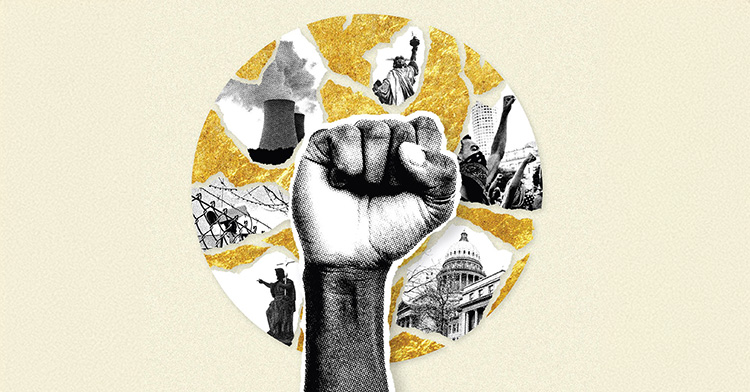
This weekend, we’ve been celebrating the life and legacy of the Rev. Dr. Martin Luther King Jr. In one of the many sound bites we often hear of King’s preaching, he references the prophet Amos as he anticipates a day when God’s “justice rolls down like waters, and righteousness like a mighty stream.” We throw those words around in our sermons and mission statements: “justice and righteousness.” But what is God calling the church to do?
The Hebrew word for “justice” is mishpat. The word appears no fewer than 200 times in Scripture. Mishpat is the idea that everyone should be treated with equal respect and judged by the same standards, regardless of their social and economic circumstances.
King’s last day was spent in Memphis, where he was preparing to speak in support of the city’s sanitation workers, who were on strike for fair wages. The images of the strike are unforgettable: Black men in dress pants, sport coats, and hats, wearing signs that read “I AM A MAN.” The sanitation workers wanted to be respected and recognized as men who were equal in every way to their white counterparts. Equitable pay was a way to seek justice and righteousness.
Righteousness is an ethical standard that refers to being in right relationship with others and with God. It involves treating others as a human made in the image of God. Modern ideas about justice often focus on seeking proper punishment for wrongdoing. Frequently in Scripture, however, mishpat is about restorative justice. Restorative justice is when we seek to protect the vulnerable, champion the cause of the oppressed and advocate for change to prevent injustice.
As we reflect on King’s life, let’s listen for God’s call to seek righteousness and justice, which is more than a dream. It’s the work of ministry.

Prince Rivers
Editor, Alban at Duke Divinity
Resources
Black church leaders help build trust as a pathway to better health
Exploitation and neglect by the scientific and medical communities have left some Black Americans hesitant to participate in research studies. Faith leaders are helping form relationships and connections they hope will address that.
By Melba Newsome
Faith partners fight against ‘heat islands’: How a coalition works to lower temperatures and decrease flooding in cities
A church and a faith-based institute join a coalition that helps people create cooler, safer neighborhoods where residents can thrive.
By Leslie Quander Wooldridge
Reconciliation is about much more than making friends
For the Seattle-based theologian, living into the reality of reconciliation means contributing to a world where all of God’s creation can flourish.
Interview with Brenda Salter McNeil
Moving beyond creation care to address environmental justice
Churches called to ministries focused on climate change should also recognize that its impact falls disproportionately on already vulnerable communities.
By Dan Holly
Technological hesitancy and digital reluctance can be barriers to digital justice
Negative attitudes toward the adoption of technology during the pandemic raise issues of fairness and justice into the future, writes the author of a study on the post-pandemic church.
By Heidi A. Campbell
Justice is calling to the weary soul of a nation
The head of the Ford Foundation discusses his philosophy of philanthropy, proximity and social justice, including the role faith communities and their leaders should play.
Interview with Darren Walker
Mass incarceration is antithetical to the gospel
The church is called to stand against the phenomenon of mass incarceration in the United States, says a pastor and author of “Rethinking Incarceration” in an interview.
Interview with Dominique D. Gilliard
P.S.
In April 1968, when King arrived in Memphis, he understood his assignment as it was related to justice: the sanitation workers needed and deserved better pay. As you will notice in the diverse resources this week, the call for justice today reaches into almost every aspect of our lives. Unequal access to technology exacerbates existing inequities. Mass incarceration leads to fragmented families and communities. Environmental injustice is connected to disproportionately poor health in economically poor neighborhoods.
No church can do the work of justice everywhere. But every church can do the work of justice somewhere. We are called to pay attention to people’s lives, embrace our neighbor’s humanity and listen to their cries for help. And let’s do this until “justice rolls down like waters, and righteousness like a mighty stream.”
You can always reach me and the Alban Weekly team at alban@duke.edu. Until next week, keep leading!







